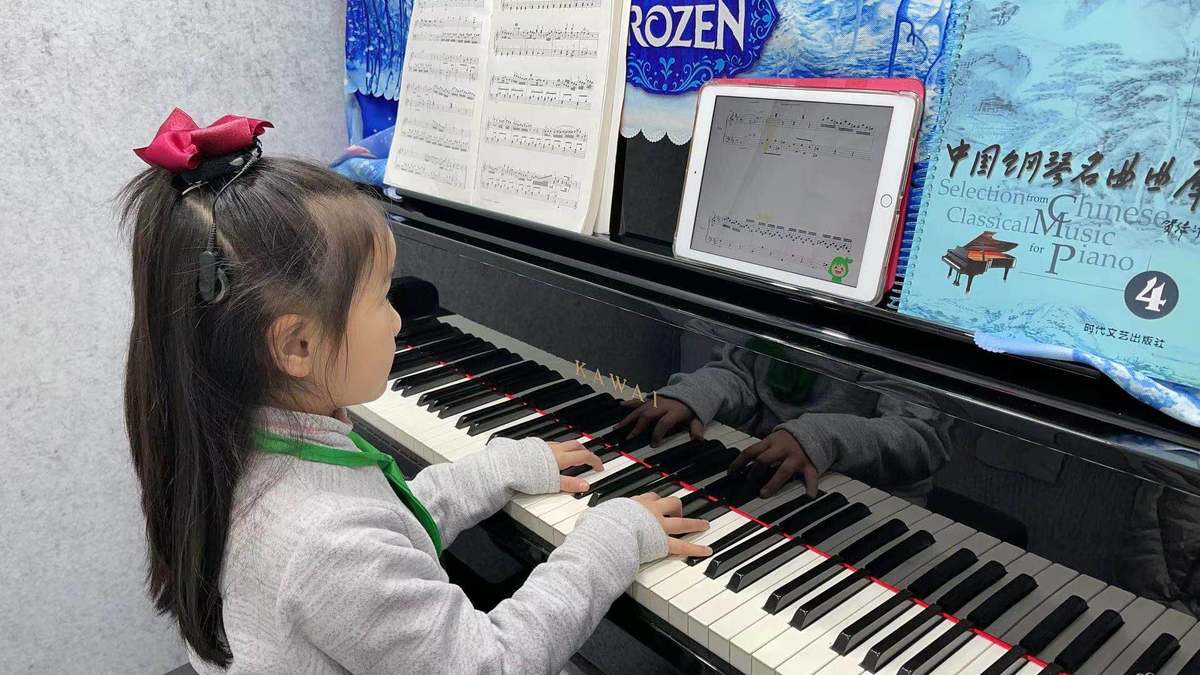Virtual classes help piano players hit the right notes


Practice was often an ordeal for 9-year-old Wang Lingyi, an aspiring piano student from Qingdao, East China's Shandong province, as no amount of hard work was helping her hit the right notes.
But things are changing these days. Lingyi is no longer the reluctant practitioner that she was some time ago. At 6 pm every day she practices for an hour or even more on the piano without fail, making her mother wonder as to how an online tool has made a sea change in her perception and understanding of music.
Lingyi ascribes her newfound interest for the piano to Xiaoyezi AI Piano Tutor, an AI-enabled online piano teaching platform, which uses a virtual cartoon figure to supervise and guide her musical journey. Not only has the lessons become more interesting for the primary school student, but also exciting as hitting the right notes would enable her to win stars, a bonus which can be exchanged for gifts afterward.
In China, online music lessons have become the latest trend in the country's burgeoning online education business, especially as COVID-19 has restricted person-to-person piano lessons.
Companies are looking to inject fresh enthusiasm into kids who are learning musical instruments, as well as their parents, who often devote much time and energy in accompanying their children to lessons.
"The market potential is big as many parents are not professionals who can instruct their children and have no idea of whether their children are doing things the right way or not," said Ye Bin, founder and chief executive of The One Music Group, the parent company of Xiaoyezi AI Piano Tutor.
"The artificial intelligence-enabled online piano tutoring app aims to make learning the piano an enjoyable experience with the help of technology," he said.
Ye said that the app comes with a smart function wherein the scoring is stopped when a person makes a mistake. The software will remind the user of the wrong sound and indicate the correct note on the screen after five seconds.
"What made this possible is our self-developed piano tone recognition technology, which is also our core competitiveness," he said, adding that the advanced tech will automatically adjust to match different pitches of different family pianos and decrease the background noise to the lowest level.
Thanks to the technology, the seven-year-old startup has managed to attract users from 107 countries and regions. World-renowned pianist Lang Lang and AI expert Kaifu Lee were among the early investors of the company.
He Yusha, chief marketing officer of The One Music Group, said that the monthly revenue of the company exceeds 100 million yuan ($15.3 million), which according to industry experts points to the success of the business model.
Founded in 2013, the Beijing-based company started with a smart piano offering artificial intelligence-based guidance for fresh learners. With LED-guided sheet music, a user can pick from thousands of songs ranging from classical to jazz, and follow along with real-time LED lights to play through any song immediately.
According to He, another business has also gained popularity during the pandemic, wherein students can take one-on-one piano lessons with teachers online. They can guide the students remotely on finger movement and position, rhythm and intonation.
The panel of teachers comprise outstanding graduates from major music schools both at home and abroad, including Birmingham Conservatory of Music, Trinity Conservatory of Music, Manhattan Conservatory of Music and Russian National Normal University.
Zhu Tianyu, a founding partner of early-stage investor Bluerun Ventures, said in a recent research report that online music lessons are a promising sector, as it aims to nurture the all-around abilities of children and not just help them achieve high grades.
However, it remains to be seen whether the business model is sustainable, judging by whether users will purchase more lessons, he said.




































